Dashnor Kaloçi
Part twenty three
Memorie.al/publishes some archival documents extracted from the Central State Archive in Tirana (the fund of the former PPSh Central Committee), which belong to the year 1982, where there is a file with relations, reports, instructions, information, letters, minutes of meetings of the Political Bureau, the Secretariat of the Central Committee, etc., regarding the “hostile activity” of the member of the Political Bureau and the Minister of People’s Defense, Kadri Hazbiu, as well as some of his closest collaborators, such as : Feçor Shehu, Mihallaq Ziçishti, Llambi Peçini, Zoi Themeli, etc., who were accused by Enver Hoxha, as “the main collaborators of the police agent Mehmet Shehu”. In the file in question, there is also a document with Kadri Hazbi’s self-criticism, dated September 27, 1982, sent to Enver Hoxha and the Political Bureau of the Central Committee of the PPSh, regarding “his poor work at the head of the Ministry of of Internal Affairs and the lack of vigilance, for not detecting hostile groups, all of which the party and Comrade Enver had discovered”. In this document, the former head of the Ministry of the Interior writes: “From the beginning of September, when I was getting my hair cut, a driver who works with the transport lines abroad came to me and told me that, returning from abroad, the drivers they had spoken badly about my fate. I didn’t ask him what he had been told, but I told him to go and report it where it should be. He added in more detail that he had spoken to the companion who stays with me, which I ordered him to report. He told me that he had done this. I don’t know whether I told him about this case or not, friend Hekuran. After a few days when I returned from a 3-4 day service, my family told me for the first time that they are taking us on the phone and so on, in meetings they ask about you, where are you and how are you, because we have heard things not good, as if we have escaped as a family abroad, as if I have been dismissed from my position as Minister of Defense, etc. I told you that anyone who asks about us, you say we are fine and don’t engage in further conversation. I emphasize that these things have spread so much that even one of the workers who serves in my family left without expecting that something is happening with me and my family. All these things, I told my friend Ramiz, together with my opinion that there is not enough fight against these harmful slogans and that they are spreading from Tirana in the first place”. Likewise, the document in question also contains the minutes of the meeting of the Political Bureau of the Central Committee of the PPSh, held on October 8, 1982, where the “hostile activity of Kadri Hazbi” from the period after the war when he was in the position of Chief of Army Security, which has brought fierce debates, they all discussed, starting from: Adil Çarçani, Hekuran Isai, Simon Stefani, Manush Muftiu, Rita Marko, Prokop Murra, Photo Çami, Lenka Çuko, Pali Miska, Besnik Bekteshi, Muho Asllani and Llambi Gegprifti. Even the debates and strong tones in that meeting were not absent between Enver Hoxha and Kadri Hazbiu, which continued throughout the meeting, for several sessions. But for more about these, we know the document, which is published for the first time by Memorie.al
Continues from last issue
The document with the minutes of the meeting of the Political Bureau of the Central Committee of the PPSh, held on October 8, 1982, where the “hostile activity” of Kadri Hazbi was analyzed
ALBANIAN LABOR PARTY TOP SECRET
CENTRAL COMMITTE
RECORDS
OF THE MEETING OF THE POLITICAL BUREAU OF THE PPS CENTRAL COMMITTEE ON OCTOBER 8, 1982
Agenda:
- Discussion on the serious words of friend Kadri Hazbiu
- Approval of the report on transport to the plenum
All members of the Political Bureau are present at the meeting.
DEVELOPMENT OF THE MEETING
The meeting was opened and led by the first secretary of the Central Committee of the PPS, Comrade Enver Hoxha.
Discussion on the serious crimes of comrade Kadri Hazbiu.
FRIEND RITA MARKO: Have you denounced these enemies? None! That’s why we also hold you accountable and you must answer us, that you, when it came to your work on the trail, also in the processes, and in the documents that we did not know, but that we heard about some very important actions, you manipulated them processes, but also manipulated them.
In the trial of Teme Sejko, it turned out that Panayot Plaku was an agent of the Americans and the Soviets. Then the question arises: Why did you, in December 1959, send to the Soviet Security all those materials, 26 secret documents of a very large character, and maintain the same connections, as before with the Soviet Security, until 1961? How did you work as the Minister of Internal Affairs? What about the analyzes that have been done from time to time in the Political Bureau and in the Central Committee regarding the disagreements we had with the Khrushchevites, you kept them in mind, right?
In your analysis of this hostile activity, it is not enough to tell us that my memory left me, here we need facts and decisions. All your work and the method you followed must be reviewed by you with a critical eye, because you have brought a great harm to the Party. You should analyze this activity to the root, but from what can be seen here, you are not doing it, because you are afraid. For us, your attitude is incomprehensible and very rude!
You must analyze and provide information that, even after Mehmet Shehu left the post of Minister of Internal Affairs, together with your main subordinates, you continued to maintain close ties with him, you called him “usta” in the affairs of safety and you, everything that you talked about before with Mehmet Shehu, trying to get his opinion first, has come in handy. With these actions, you liked to be under his control, that’s why he kept you very close, which was noticed by everyone.
Mehmet Shehu and Feçor Shehu, when you did the analysis in the ministry regarding the hostile group of Beqir Balluk, Abdyl Këllez, etc., they told you not to promote the work of the State Security, while Hysniu was more objective. This is what you write in your self-criticism. To whom did you make this known, that here we have different assessments, for an important and very large analysis by the members of the Political Bureau. Below you say that, when Fecor Shehu became the minister, Mehmet Shehu said that the Ministry of Internal Affairs has not done anything for a very long time, I don’t know how much goes there, but he calculates about 18 years. With whom did you discuss this, considering that Mehmet Shehu came to you twice with opposite opinions?
In the self-criticism, you also say that you have adopted such attitudes, and even in special cases you have countered and continue further than a mistake in your work, you also saw in the lack of determination to raise issues wherever and whenever, that you had different opinions about many Security problems, such as theft, detection of sabotage, penetration of people without warrant in various jobs, organization of the border, etc., but in self-criticism he emphasizes that, you were not able to make the right connection and how he deceived you! However, the Party had put you in charge of the Ministry of Internal Affairs so that you would not be deceived and connect all these issues.
Now the question arises, that with all these big problems related to the main tasks of the Ministry of Internal Affairs, you have encountered, as you say in your self-criticism, however, why did you not raise them in the Party to Comrade Enver?! No, you are not being honest here, Kadri! Or have you raised these in the apparatus, in the Administrative Directorate, and to me? No, not even here, that’s why you are also not honest here, that’s why you have to open up to the Party, take out your main heavy responsibility, where and how opinion was formed in the Central Committee and in the Political Bureau, that about the hostile activity of Mehmet Shehu , you brought many facts?
First, you being the Minister of Internal Affairs, which was also pointed out by the friends, you only showed a few unimportant things, which caught everyone’s eye about him, even about the work of the guards for whom you had spoken by Feti Smokthina 20 years ago. But why was this duty? Secondly, you spoke here about some issues that you had told Feçor Shehu. On the contrary, due to your lack of vigilance, they made the job easier for Feçor Shehu. You told us here that he is an agent, but for this more than anyone, you had to bring us facts and documents that have come forward in the processes and of which you were aware, as they came out today, putting it seems that his name had come up here or there.
Did you bring any facts about it? No, you didn’t do that, but the Party did it, Comrade Enver did it. Did you tell us that in this or that process, this or that issue came up for Mehmet Shehu? No. Then how is it possible that you, who have been in charge of the State Security bodies all your life, and this or those others who were agents, never came across your path?! Did you run the affairs in the Ministry of Internal Affairs and State Security, or did these enemies run them and you were a nominal minister? No, we don’t know you like that. So you didn’t give anything important and essential, when the work of this great enemy was analyzed and even now in self-criticism, you don’t say anything of value to the Party? Comrade Enver called you and informed you in detail about this old agency of Mehmet Shehu and about its activities, and you easily tell us that Mehmet Shehu can have no other collaborator except Feçor Shehu?!
Are you allowed, a senior and key employee of the State Security, to conceive of this? But why would Mehmet Shehu only with Feçor Shehu realize his dark plans to overthrow the popular power?! Are you allowed to express it in self-criticism like this, without doing a very deep analysis of this opinion? In the self-criticism, you say that one of the reasons you did not discover the hostile activity of Mehmet Shehu is that you did not educate the employees of the bodies of the Ministry of Internal Affairs, etc., etc., that this weakness was influenced by the pressure of the enemies who surrounded you and those who operationally directed the Ministry of Internal Affairs, such as Mehmet Shehu and Beqir Balluku? And you, what did you do? How did you run the Ministry of Internal Affairs? The party has the strength, I think, to clarify the issue to the end, and the absence of Hysni Kapo does not complicate anything related to you.
You cannot confuse Hysni Kapo at all, and the attempt you make, to pass the responsibility to the secretary of the Central Committee who dealt with the cadre, that he did not help to discover the actions of these enemies, is done with malicious intent. Analyzing all this hostile work carried out by these agents, in the light of Comrade Enver’s speech, every party member is responsible, even more so those cadres who have done party work everywhere and in the Central Committee, of which I am one. . What is required of you is to bring out and clarify that these collaborators were not brought to you by anyone, but you had them yourself in the ministry, you worked with them continuously, you directed them operationally, you assigned them tasks and have reported.
You cooperated and lived with them; therefore it was your duty to control their activities. So the responsibility is direct, you can’t get away from it. In the final analysis, you should have been the one to come to the Central Committee of the Party to report on their weaknesses, to show how they worked. On the contrary, you didn’t say anything to the Party, but you reduced or covered up the flaws of your collaborators, thus you did a closed job, for which you were constantly criticized. Won’t you make us responsible for your work? You say that you gave everything to the Soviet Security, because that’s how you practiced with them before that are why you acted like that afterwards. However, you have no decision to justify this practice.
The disputes that began with the Khrushchevites since 1954, as Comrade Enver writes in the book “Khrushevites”, the 20th Congress of the Communist Party of the Soviet Union, the Tirana Conference, the rehabilitation of Tito by Khrushchev, the conspiracy of Teme Sejko, the escape of Panajo The old man and the corresponding analysis that the Party has made of these events, did not impress you one bit to think about the agency you gave to the Soviets and to see all our relations with them?! By giving the Soviet Security all this agency, you had also given them the object of this agency, which was even more serious. What about the accusation that came to our Party in 1953, after Stalin’s death, from Beria and from Suslov, according to which, in the Army we had unsafe cadres, beyler boys, as they said to Comrade Enver, didn’t you think a bit? You and Mehmet Shehu had given them the information that you were the first deputy minister at that time, when he was the minister of internal affairs.
In self-criticism, you now say that you have facts that the Central Committee members can know. Then, when this is the case according to you, in the material you sent to Hysni Kapo in 1975, why don’t you say that I reported this to the Central Committee in writing or orally? Yes, this is also a futile attempt by Kadri Hazbiu, to relieve him, to escape responsibility. I want to make it known here that I was involved with the former Administrative Directorate from the beginning of 1951 until the middle of 1957, when I was sent to school in the Soviet Union. I assure the Political Bureau, that for these actions, I neither knew nor was told by anyone, that we have given agency to the Soviet Security bodies, or have been established with these relations or those relations in this field. I want to emphasize that I have never been talked about agency constructions and Counterintelligence. I didn’t even ask for this, because I knew very well that it wasn’t up to me, thinking that these were the jobs of the First Secretary of the Party Central Committee, of the Defense Council.
I also want to point out that for a while, I was indeed the Secretary of the Central Committee, but I was a candidate of the Party Central Committee. Every task that was assigned to me at that time in this field, I tried to perform it within the powers that belonged to me, based on the orders and teachings of Comrade Enver. In your self-criticism, Kadri, you say that you have seen and directed safety with concern. If this is the case, how is it explained that you managed it so badly, not being able to detect the hostile activity of these cadres who were your assistants, but you let them do as they want! That you surrounded the leadership of the Party with all these snakes, as Comrade Enver says in the material. You tell us that if you knew that Feçor Shehu and Mihallaq Ziçishti were of weak morals, you would have helped in their discovery. You were working and living day after day with these people in a sick family. From whom do you ask for this “help”? You yourself, what have you done? Where do you receive the data from? Instead of giving data to the Party, indirectly, you demand accountability!
You, Kadri, sent one of the most important documents of our state to the Soviet Security in December 1959, did you not know until this time what Khrushchev had raised against our Party? We held a special meeting of the plenum of the Central Committee of the Party at that time, to condemn the issue of the Yugoslavs, because at this time Comrade Enver also published an article and all that, then you didn’t know what Khrushchev raised about Panayot the Elder and Release Gega and now you come here and tell us that they were sent without your knowledge?! You have acted to the detriment of our state’s interests, giving the Soviets some of the biggest secrets our state has about State Security affairs, such as the Security Platform, directives on the duties of Internal Affairs bodies, instructions on evidence operational, which is also one of the most important, order No. 1 on geology, the list of special people, the relation for Liri Gega, the relation for Dhora Leka, even with a list composed of 50 people? At that time, you told the Operative worker that everything should be given to the Soviets.
In the self-criticism you say that based on some surveys you did about the agency, you realized that it was instructed by the Soviets. How did you not worry about this fact and report it to the Central Committee of the Party? You tell us that you worked day and night in the investigator, to unravel the hostile activity of the putschists, constantly going by yourself. This charges you with an even greater responsibility, that their processes have been manipulated, and many things have been covered up. Other documents that came out here show that Teme Sejko, who was the Chief of Intelligence in the Army, a member of the Political Section of the First Brigade, one of the first five cadres who went to military studies in the Soviet Union, started the process by issuing, as you say in your self-criticism, a whole network of Greek and American spies, that he started talking about Panayot the Elder as a Soviet agent who had entered Albania several times as a liaison. In self-criticism, you say that he did not speak again and that his process was not unraveled, the question of connections and hostile actions carried out by his group remained undiscovered.
COMRADE ENVER HOXHA: I’m waiting for your word, but the name of Arif Hasko, why didn’t you mention it, but left him free for such a long time?
COMRADE KADRI HAZBIU: I know, Comrade Enver, that this issue has been addressed.
COMRADE ENVER HOXHA: Arif Haskon, didn’t you take it out?
COMRADE KADRI HAZBIU: I know that his case has been dealt with.
COMRADE ENVER HOXHA: How was this issue handled?
COMRADE KADRI HAZBIU: Yes, it was always left in doubt then.
COMRADE ENVER HOXHA: Right? And when Beqir Balluk’s group was discovered, why didn’t you go ahead and say, take this Arif Hasko, without getting caught, that this thing has turned out for him?
COMRADE KADRI HAZBIU: I know one thing, Comrade Enver that at that time there was a question mark, whether it had gone to the Soviets Panajot Plaku, or Arif Haskoja. We tried to verify this matter and came to the conclusion that it had been with the Soviet adviser.
COMRADE ENVER HOXHA: Why didn’t you point out these data, or this conclusion?
COMRADE KADRI HAZBIU: I mean, this was his hypothesis.
COMRADE HEKURAN ISAI: His hypothesis? But why don’t you fall for the hypothesis that it was with Arif Haskoja, but with the Soviet that was not here?!
COMRADE KADRI HAZBIU: No, the Soviet was not here, it was Comrade Hekuran at that time.
COMRADE RAMIZ ALIA: Yes, we expelled the Soviet at that time. Memorie.al
The next issue follows




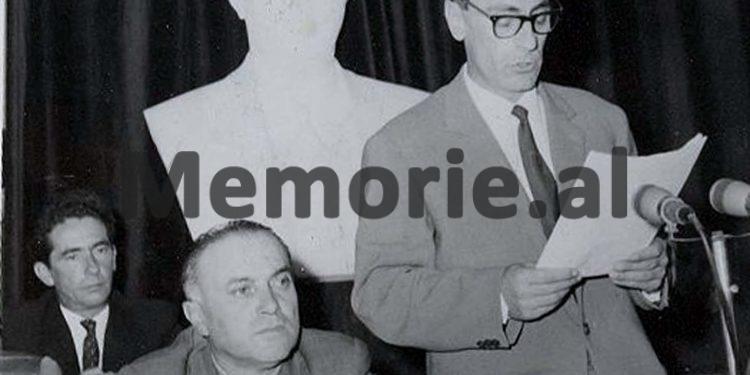
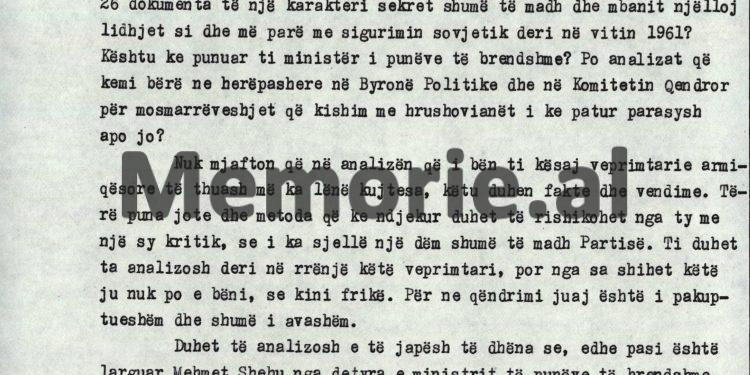
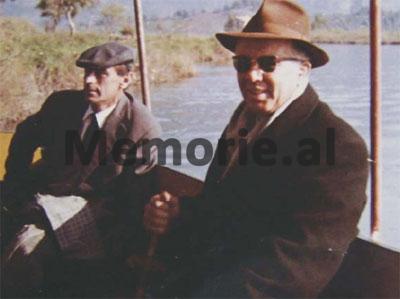

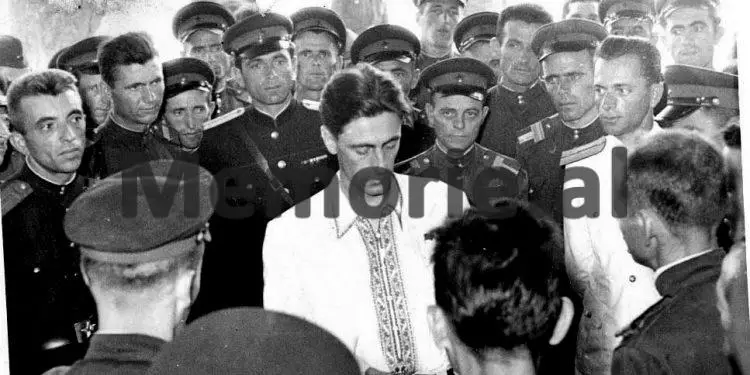
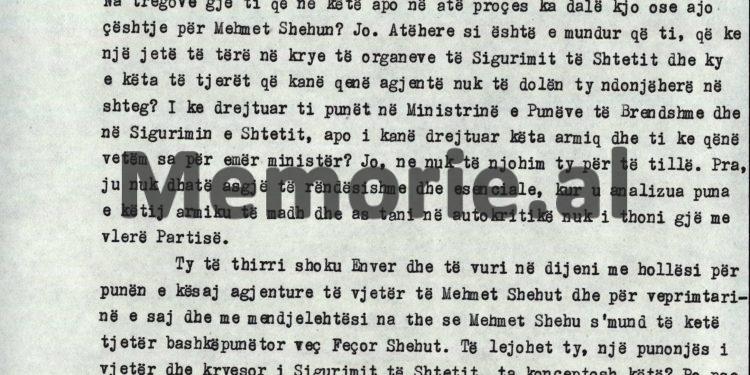
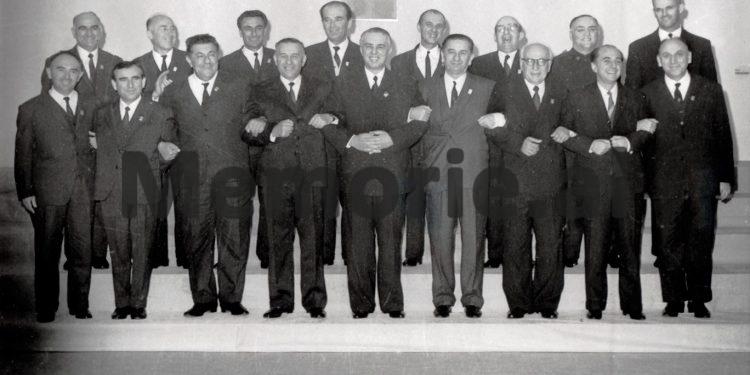
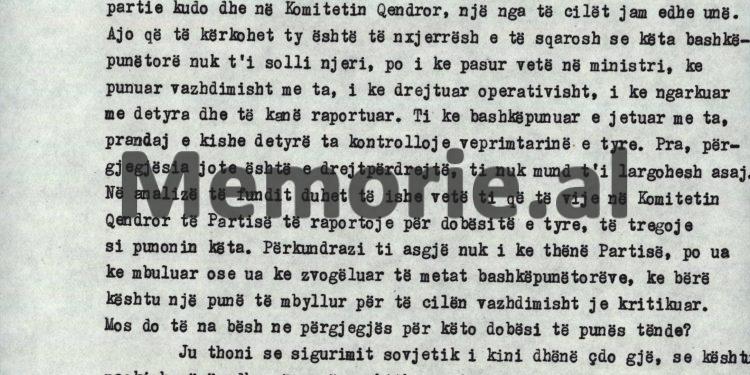
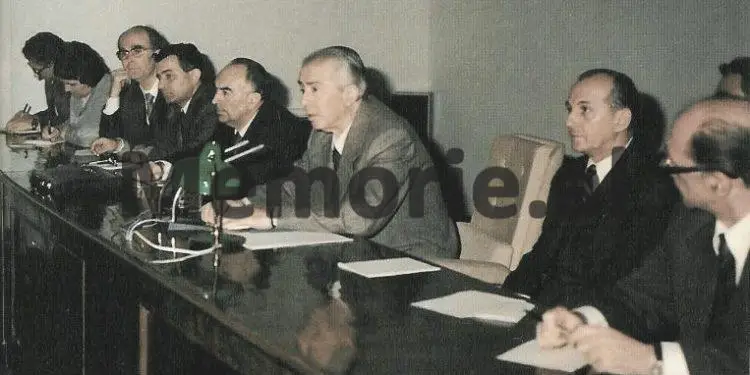
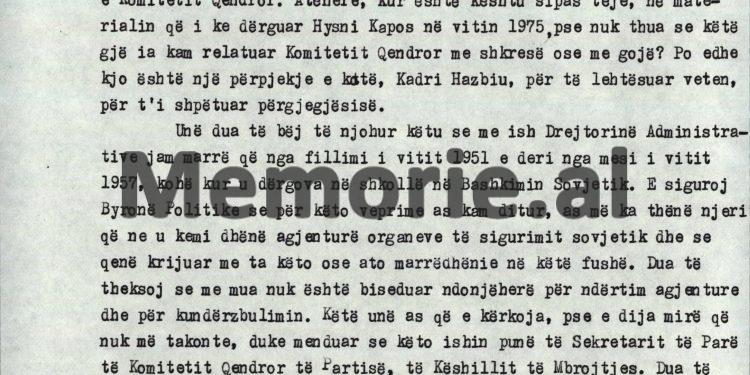


![“The ensemble, led by saxophonist M. Murthi, violinist M. Tare, [with] S. Reka on accordion and piano, [and] saxophonist S. Selmani, were…”/ The unknown history of the “Dajti” orchestra during the communist regime.](https://memorie.al/wp-content/uploads/2026/02/admin-ajax-3-350x250.jpg)
![“In an attempt to rescue one another, 10 workers were poisoned, but besides the brigadier, [another] 6 also died…”/ The secret document of June 11, 1979, is revealed, regarding the deaths of 6 employees at the Metallurgy Plant.](https://memorie.al/wp-content/uploads/2026/02/maxresdefault-350x250.jpg)


